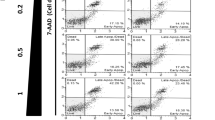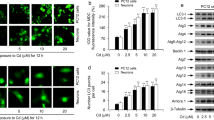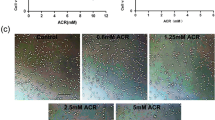Abstract
Autophagy and apoptosis are the major types of cell death in pesticide-induced neurotoxicity, and autophagy is known to play a role in cell protection by inhibiting apoptosis. In this study, we characterized the relationship between autophagy and apoptosis in diquat (DQ)-induced cell death and explored a novel pharmacotherapeutic approach involving autophagy regulation to prevent DQ neurotoxicity. DQ was cytotoxic to PC12 cells in a concentration-dependent manner, as shown by decreased cell viability and decreased dopamine (DA) levels. DQ-induced apoptosis was found in PC12 cells, as demonstrated by activation of caspase-3 and -9 and by nuclear condensation. By monitoring expression of microtubule-associated protein 1A/1B light chain 3B (LC3-II) and p62, DQ was found to induce autophagy. Exposure of PC12 cells to DQ led to the production of reactive oxygen species (ROS), and N-acetyl-cysteine (NAC) antioxidant effectively blocked both apoptosis and autophagy. Interestingly, DQ in PC12 cells showed increased p53 and NF-κB in a time-dependent manner; furthermore, pifithrin-α (PFT-α), a p53 inhibitor, downregulates the cytotoxicity of DQ, as shown by decreased LC3-II and cleaved caspase-3. SN50, an NF-κB inhibitor, results in diminished LC3-II, cleaved caspase-3, and p53. DQ induces mitogen-activated protein kinase (MAPK) signaling including ERK, JNK, and p38, which inhibit regulated apoptosis and autophagic cell death by controlling mTOR signaling. In addition, modulation of DQ-induced apoptosis in response to autophagy regulation was investigated. Pretreatment with rapamycin, an autophagy inducer, significantly enhanced the viability of DQ-exposed cells by alleviating DQ-induced apoptosis. Conversely, cell pretreatment with 3-methyladenine (3MA), an autophagy inhibitor increased DQ toxicity. Our results suggest that DQ-induced cytotoxicity is modified by autophagy regulation. Pharmacologic induction of autophagy may be a useful treatment strategy in neurodegenerative disorders.






Similar content being viewed by others
References
Bove J, Perier C (2012) Neurotoxin-based models of Parkinson’s disease. Neuroscience 211:51–76. https://doi.org/10.1016/j.neuroscience.2011.10.057
Cheng Y, Qiu F, Tashiro S, Onodera S, Ikejima T (2008) ERK and JNK mediate TNFalpha-induced p53 activation in apoptotic and autophagic L929 cell death. Biochem Biophys Res Commun 376(3):483–488. https://doi.org/10.1016/j.bbrc.2008.09.018
Choi SE, Park YS, Koh HC (2018) NF-kappaB/p53-activated inflammatory response involves in diquat-induced mitochondrial dysfunction and apoptosis. Environ Toxicol. https://doi.org/10.1002/tox.22552
Cuadrado A, Nebreda AR (2010) Mechanisms and functions of p38 MAPK signalling. Biochem J 429(3):403–417. https://doi.org/10.1042/BJ20100323
Dadakhujaev S, Noh HS, Jung EJ et al (2010) Autophagy protects the rotenone-induced cell death in alpha-synuclein overexpressing SH-SY5Y cells. Neurosci Lett 472(1):47–52. https://doi.org/10.1016/j.neulet.2010.01.053
Debnath J, Baehrecke EH, Kroemer G (2005) Does autophagy contribute to cell death? Autophagy 1(2):66–74
Fischer LR, Glass JD (2010) Oxidative stress induced by loss of Cu,Zn-superoxide dismutase (SOD1) or superoxide-generating herbicides causes axonal degeneration in mouse DRG cultures. Acta Neuropathol 119(2):249–259. https://doi.org/10.1007/s00401-009-0631-z
Foley P, Riederer P (2000) Influence of neurotoxins and oxidative stress on the onset and progression of Parkinson’s disease. J Neurol 247(Suppl 2):II82–I94
Furukawa K, Estus S, Fu W, Mark RJ, Mattson MP (1997) Neuroprotective action of cycloheximide involves induction of bcl-2 and antioxidant pathways. J Cell Biol 136(5):1137–1149
Ghavami S, Shojaei S, Yeganeh B et al (2014) Autophagy and apoptosis dysfunction in neurodegenerative disorders. Prog Neurobiol 112:24–49. https://doi.org/10.1016/j.pneurobio.2013.10.004
Gonzalez-Polo RA, Niso-Santano M, Ortiz-Ortiz MA et al (2007a) Inhibition of paraquat-induced autophagy accelerates the apoptotic cell death in neuroblastoma SH-SY5Y cells. Toxicol Sci 97(2):448–458. https://doi.org/10.1093/toxsci/kfm040
Gonzalez-Polo RA, Niso-Santano M, Ortiz-Ortiz MA et al (2007b) Relationship between autophagy and apoptotic cell death in human neuroblastoma cells treated with paraquat: could autophagy be a “brake” in paraquat-induced apoptotic death? Autophagy 3(4):366–367
Greene LA, Tischler AS (1976) Establishment of a noradrenergic clonal line of rat adrenal pheochromocytoma cells which respond to nerve growth factor. Proc Natl Acad Sci U S A 73(7):2424–2428
Jung CH, Ro SH, Cao J, Otto NM, Kim DH (2010) mTOR regulation of autophagy. FEBS Lett 584(7):1287–1295. https://doi.org/10.1016/j.febslet.2010.01.017
Kanthasamy A, Jin H, Anantharam V et al (2012) Emerging neurotoxic mechanisms in environmental factors-induced neurodegeneration. Neurotoxicology 33(4):833–837. https://doi.org/10.1016/j.neuro.2012.01.011
Kim A, Yim NH, Ma JY (2013) Samsoeum, a traditional herbal medicine, elicits apoptotic and autophagic cell death by inhibiting Akt/mTOR and activating the JNK pathway in cancer cells. BMC Complement Altern Med 13:233. https://doi.org/10.1186/1472-6882-13-233
Kumar A, Takada Y, Boriek AM, Aggarwal BB (2004) Nuclear factor-kappaB: its role in health and disease. J Mol Med (Berl) 82(7):434–448. https://doi.org/10.1007/s00109-004-0555-y
Lee JE, Park JH, Shin IC, Koh HC (2012) Reactive oxygen species regulated mitochondria-mediated apoptosis in PC12 cells exposed to chlorpyrifos. Toxicol Appl Pharmacol 263(2):148–162. https://doi.org/10.1016/j.taap.2012.06.005
Lee JE, Lim MS, Park JH, Park CH, Koh HC (2014) Nuclear NF-kappaB contributes to chlorpyrifos-induced apoptosis through p53 signaling in human neural precursor cells. Neurotoxicology 42:58–70. https://doi.org/10.1016/j.neuro.2014.04.001
Lee JE, Lim MS, Park JH, Park CH, Koh HC (2016) PTEN promotes dopaminergic neuronal differentiation through regulation of ERK-dependent inhibition of S6K signaling in human neural stem cells. Stem Cells Transl Med 5(10):1319–1329. https://doi.org/10.5966/sctm.2015-0200
Lin X, Mu Y, Cunningham ET Jr, Marcu KB, Geleziunas R, Greene WC (1998) Molecular determinants of NF-kappaB-inducing kinase action. Mol Cell Biol 18(10):5899–5907
Lin Z, Liu T, Kamp DW et al (2014) AKT/mTOR and c-Jun N-terminal kinase signaling pathways are required for chrysotile asbestos-induced autophagy. Free Radic Biol Med 72:296–307. https://doi.org/10.1016/j.freeradbiomed.2014.04.004
Liu J, Chang F, Li F et al (2015) Palmitate promotes autophagy and apoptosis through ROS-dependent JNK and p38 MAPK. Biochem Biophys Res Commun 463(3):262–267. https://doi.org/10.1016/j.bbrc.2015.05.042
Lotte J, Bast T, Borusiak P et al (2016) Effectiveness of antiepileptic therapy in patients with PCDH19 mutations. Seizure 35:106–110. https://doi.org/10.1016/j.seizure.2016.01.006
Luo JL, Kamata H, Karin M (2005) IKK/NF-kappaB signaling: balancing life and death–a new approach to cancer therapy. J Clin Invest 115(10):2625–2632. https://doi.org/10.1172/JCI26322
Maiese K, Chong ZZ, Shang YC, Wang S (2013) mTOR: on target for novel therapeutic strategies in the nervous system. Trends Mol Med 19(1):51–60. https://doi.org/10.1016/j.molmed.2012.11.001
Maiuri MC, Zalckvar E, Kimchi A, Kroemer G (2007) Self-eating and self-killing: crosstalk between autophagy and apoptosis. Nat Rev Mol Cell Biol 8(9):741–752. https://doi.org/10.1038/nrm2239
Mori A, Ohashi S, Nakai M, Moriizumi T, Mitsumoto Y (2005) Neural mechanisms underlying motor dysfunction as detected by the tail suspension test in MPTP-treated C57BL/6 mice. Neurosci Res 51(3):265–274. https://doi.org/10.1016/j.neures.2004.11.008
Nishida K, Yamaguchi O, Otsu K (2008) Crosstalk between autophagy and apoptosis in heart disease. Circ Res 103(4):343–351. https://doi.org/10.1161/CIRCRESAHA.108.175448
Park JH, Lee JE, Lee SJ et al (2013a) Potential autophagy enhancers protect against fipronil-induced apoptosis in SH-SY5Y cells. Toxicol Lett 223(1):25–34. https://doi.org/10.1016/j.toxlet.2013.08.015
Park JH, Lee JE, Shin IC, Koh HC (2013b) Autophagy regulates chlorpyrifos-induced apoptosis in SH-SY5Y cells. Toxicol Appl Pharmacol 268(1):55–67. https://doi.org/10.1016/j.taap.2013.01.013
Park YS, Park JH, Ko J, Shin IC, Koh HC (2017) mTOR inhibition by rapamycin protects against deltamethrin-induced apoptosis in PC12 Cells. Environ Toxicol 32(1):109–121. https://doi.org/10.1002/tox.22216
Pellacani C, Costa LG (2018) Role of autophagy in environmental neurotoxicity. Environ Pollut 235:791–805. https://doi.org/10.1016/j.envpol.2017.12.102
Qi M, Elion EA (2005) MAP kinase pathways. J Cell Sci 118(Pt 16):3569–3572. https://doi.org/10.1242/jcs.02470
Saiki S, Sasazawa Y, Imamichi Y et al (2011) Caffeine induces apoptosis by enhancement of autophagy via PI3K/Akt/mTOR/p70S6K inhibition. Autophagy 7(2):176–187
Sandy MS, Moldeus P, Ross D, Smith MT (1986) Role of redox cycling and lipid peroxidation in bipyridyl herbicide cytotoxicity. Studies with a compromised isolated hepatocyte model system. Biochem Pharmacol 35(18):3095–3101
Schapira AH, Cooper JM, Dexter D, Jenner P, Clark JB, Marsden CD (1989) Mitochondrial complex I deficiency in Parkinson’s disease. Lancet 1(8649):1269
Sechi GP, Agnetti V, Piredda M et al (1992) Acute and persistent parkinsonism after use of diquat. Neurology 42(1):261–263
Shi R, Weng J, Zhao L, Li XM, Gao TM, Kong J (2012) Excessive autophagy contributes to neuron death in cerebral ischemia. CNS Neurosci Ther 18(3):250–260. https://doi.org/10.1111/j.1755-5949.2012.00295.x
Shintani T, Klionsky DJ (2004) Autophagy in health and disease: a double-edged sword. Science 306(5698):990–995. https://doi.org/10.1126/science.1099993
Sivaprasad U, Basu A (2008) Inhibition of ERK attenuates autophagy and potentiates tumour necrosis factor-alpha-induced cell death in MCF-7 cells. J Cell Mol Med 12(4):1265–1271. https://doi.org/10.1111/j.1582-4934.2008.00282.x
Slaughter MR, Thakkar H, O’Brien PJ (2002) Effect of diquat on the antioxidant system and cell growth in human neuroblastoma cells. Toxicol Appl Pharmacol 178(2):63–70. https://doi.org/10.1006/taap.2001.9322
Sridharan S, Jain K, Basu A (2011) Regulation of autophagy by kinases. Cancers (Basel) 3(2):2630–2654. https://doi.org/10.3390/cancers3022630
Srivastava R (2007) Apoptosis, cell signaling, and human diseases: molecular mechanisms. Humana Press, Totowa
Sui X, Kong N, Ye L et al (2014) p38 and JNK MAPK pathways control the balance of apoptosis and autophagy in response to chemotherapeutic agents. Cancer Lett 344(2):174–179. https://doi.org/10.1016/j.canlet.2013.11.019
Teng KK, Greene LA (1994) KT5926 selectively inhibits nerve growth factor-dependent neurite elongation. J Neurosci 14(5 Pt 1):2624–2635
Trocoli A, Djavaheri-Mergny M (2011) The complex interplay between autophagy and NF-kappaB signaling pathways in cancer cells. Am J Cancer Res 1(5):629–649
Wang Y, Dong XX, Cao Y et al (2009) p53 induction contributes to excitotoxic neuronal death in rat striatum through apoptotic and autophagic mechanisms. Eur J Neurosci 30(12):2258–2270. https://doi.org/10.1111/j.1460-9568.2009.07025.x
Wei Y, Pattingre S, Sinha S, Bassik M, Levine B (2008) JNK1-mediated phosphorylation of Bcl-2 regulates starvation-induced autophagy. Mol Cell 30(6):678–688. https://doi.org/10.1016/j.molcel.2008.06.001
Wu F, Wang Z, Gu JH, Ge JB, Liang ZQ, Qin ZH (2013) p38(MAPK)/p53-Mediated Bax induction contributes to neurons degeneration in rotenone-induced cellular and rat models of Parkinson’s disease. Neurochem Int 63(3):133–140. https://doi.org/10.1016/j.neuint.2013.05.006
Zhu JH, Horbinski C, Guo F, Watkins S, Uchiyama Y, Chu CT (2007) Regulation of autophagy by extracellular signal-regulated protein kinases during 1-methyl-4-phenylpyridinium-induced cell death. Am J Pathol 170(1):75–86. https://doi.org/10.2353/ajpath.2007.060524
Acknowledgements
This study contains parts of Aeri Park’s master dissertation at Graduate school of Biomedical Science & Engineering, Hanyang University. This work was supported by the Korea Science and Engineering Foundation (2017R1A5A2015395) through the Medical Research Center at Hanyang University College of Medicine, Republic of Korea, and by the Basic Science Research Program through the National Research Foundation of Korea (NRF) funded by the Ministry of Education, Science, and Technology (2015R1D1A1A01059531).
Author information
Authors and Affiliations
Corresponding author
Ethics declarations
Conflict of interest
The authors have no conflicts of interest to declare.
Additional information
Publisher’s Note
Springer Nature remains neutral with regard to jurisdictional claims in published maps and institutional affiliations.
Electronic supplementary material
Below is the link to the electronic supplementary material.
Rights and permissions
About this article
Cite this article
Park, A., Koh, H.C. NF-κB/mTOR-mediated autophagy can regulate diquat-induced apoptosis. Arch Toxicol 93, 1239–1253 (2019). https://doi.org/10.1007/s00204-019-02424-7
Received:
Accepted:
Published:
Issue Date:
DOI: https://doi.org/10.1007/s00204-019-02424-7




